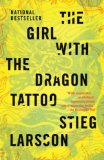Book Club Discussion Questions
In a book club? Subscribe to our Book Club Newsletter!
Please be aware that this discussion guide will contain spoilers!
About This Guide
The questions, discussion topics, and reading list that follow are intended to enhance your reading group's discussion of Stieg Larsson's extraordinary thriller, The Girl with the Dragon Tattoo.
About This Book
This spellbinding amalgam of murder mystery, family saga, love story, and financial intrigue was a sensation across Europe, with millions of copies sold.
It's about the disappearance forty years ago of Harriet Vanger, a young scion of one of the wealthiest families in Sweden...and about her octogenarian uncle, determined to know the truth about what he believes was her murder.
It's about Mikael Blomkvist, a crusading journalist recently at the wrong end of a libel case, hired to get to the bottom of Harriet’s disappearance...and about Lisbeth Salander, a twenty-four-year-old pierced and tattooed genius hacker possessed of the hard-earned wisdom of someone twice her age - and a terrifying capacity for ruthlessness to go with it - who assists Blomkvist with the investigation. This unlikely team discovers a vein of nearly unfathomable iniquity running through the Vanger family, astonishing corruption in the highest echelons of Swedish industrialism - and an unexpected connection between themselves.
Reader's Guide
- Who do you consider the novel's protagonist, Lisbeth or Mikael? Why?
-
What point was Larsson trying to make with the themes running through this novel? How do issues such as man's brutality to women, journalistic integrity, and more general notions of trust tie in with each other throughout the book?
-
What function do the sex-crime statistics on each section's title page serve?
4. Re-read the passage from Mikael's book on page 84. What is its significance, in terms of the plot?
-
On page 126, Henrik tells Mikael, "If there’s one thing I’ve learned, it’s never engage in a fight you're sure to lose. On the other hand, never let anyone who has insulted you get away with it. Bide your time and strike back when you're in a position of strength - even if you no longer need to strike back." Over the course of the novel, who puts this advice to the best use? How, and why?
-
How does the involvement of several Vanger brothers with Swedish fascist groups cloud Mikael's investigation into Harriet’s disappearance? What role does Harald play?
-
Why does Henrik become an investor in Millennium? Does his plan succeed?
-
Discuss the character of Lisbeth. Some think she is a "perfect victim" (page 324), others find her intimidating, and Mikael wonders if she has Asperger's, but the reader is allowed to see exactly how her mind works. How do you see her? How do you think she sees herself?
-
What do you think about the way Lisbeth turns the tables on Bjurman? Is it admirable, or a sign that she's unstable?
-
On page 202, Lisbeth says her new tattoo is "a reminder." Of what?
-
Several times in the novel, Mikae'’s journalistic ethics are challenged. Do you consider him to be ethical? In your opinion, is anyone in the novel truly honorable? Who, and why?
-
After reserving judgment for most of his investigation, on page 238 Mikael determines that Harriet was, in fact, murdered and that he's hunting for a killer. What prompts this decision? How does this affect the rest of his investigation?
-
Discuss the role of parents in the novel. Who is a good parent, and why? How might Harriet's story have changed if her mother had behaved differently? What about Lisbeth's? Is Mikael a good father?
-
Blackmail is used several times in the novel, for different ends. Who uses it most effectively, and why?
-
On page 400, Mikael tells Lisbeth that to him, friendship requires mutual respect and trust. By those standards, who in this novel is a good friend? Is Mikael? What about Anita?
-
Discuss Henrik's request that Mikael never publish the Vanger story. Is it a reasonable request? Does Mikael's acquiescence change your opinion of him? Do Lisbeth's demands mitigate his ethical breach?
-
What ultimately drives Lisbeth to take action against Wennerström on her own? Does she go too far?
-
Re-read Mikael's statement about the media's responsibility at the top of page 454. Can you think of a situation in the American media that is analogous to the Wennerström affair?
-
Discuss the ending. Was it satisfying to you? Why or why not?
SUGGESTED READING
Gorky Park by Martin Cruz Smith; Smilla's Sense of Snow by Peter Høeg; The Shock Doctrine: The Rise of Disaster Capitalism by Naomi Klein; The Elements of Journalism: What Newspeople Should Know and the Public Should Expect, by Bill Kovach and Tom Rosenstiel
Unless otherwise stated, this discussion guide is reprinted with the permission of Vintage.
Any page references refer to a USA edition of the book, usually the trade paperback version, and may vary in other editions.
